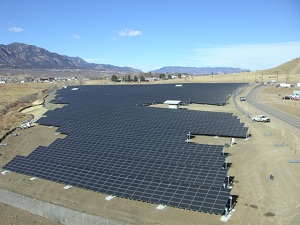New Garden State bill has solar blooming
 New Jersey already is already the nation’s second largest producer of solar electricity, behind California. But new legislation working its way through the state legislature should help the state retains its place as number two for a while. And by allowing renewable energy plants to be placed on closed landfills and quarries, the potential law would help eradicate its “garbage state” moniker, which eastern seaboard travelers have come to call it.
New Jersey already is already the nation’s second largest producer of solar electricity, behind California. But new legislation working its way through the state legislature should help the state retains its place as number two for a while. And by allowing renewable energy plants to be placed on closed landfills and quarries, the potential law would help eradicate its “garbage state” moniker, which eastern seaboard travelers have come to call it.
The bill, S-2126, would allow the development of solar, photovoltaic (PV) and wind energy facilities on closed landfills, mines and quarries. It was introduced by Sen. Jim Whelan (D) and passed the state Senate unanimously on Aug. 23.
In a press release, Whelan said, “With the environmental crisis gripping the Gulf of Mexico in the wake of the massive BP oil spill, there’s more demand than ever for clean, renewable and sustainable forms of energy.” He continued, “This bill is good news for the environment, and will result in new jobs and new economic activity for struggling communities throughout the state.”
In the past, waste sites have been used for developments—like Manhattan (the island really was built on trash)—and golf courses. But New Jersey is not the first state to build renewable energy on closed landfills or former mines and quarries. For instance, a 2 megawatt PV plant already covers a former landfill in Fort Carson, Colo.
According to Whelan’s office, the bill would allow every municipality in the state to convert such sites into renewable energy plants. The office pointed out that one such area—the Pinelands region—could stand to benefit drastically from the potential legislation. The region has 80 total landfills, only two of which are capped. “The other 78 landfills are sitting as unusable, undevelopable land,” the office stated.
“If we continue at the current rate of landfill remediation, it could take up to 300 years before every landfill in the Pinelands is restored to usable land,” said Senator Whelan. “We need economic solutions today to put people to work, and if we can promote an emerging, environmentally-friendly business model, that’s even better.”
The bill now heads to New Jersey’s Assembly for a vote.



